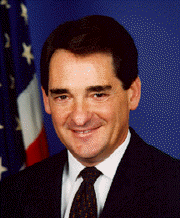Event: Senate Communications Subcommittee hearing.
Re: broadband deployment in rural areas.
Date: March 28, 2000.
Source: Senate Commerce Committee.

| Opening Statement of Rep. Billy Tauzin (R-LA). Event: Senate Communications Subcommittee hearing. Re: broadband deployment in rural areas. Date: March 28, 2000. Source: Senate Commerce Committee. |
 |
|
|
|
||
Statement of Congressman W.J. "Billy" Tauzin
Chairman, Subcommittee on Telecommunications, Trade
and Consumer Protection
Before the Senate Subcommittee on Communications
Hearing on Broadband Access in Rural America
3/28/00
Good morning, and thank you, Mr. Chairman, for inviting me to testify before your Subcommittee on Communications.
Broadband, or rather the lack thereof, is an issue that not many are talking about right now. Most of what we hear is that the Act is working -- so leave it alone. The fact is, however, that the Act was never intended to address Broadband deployment except in the most general terms -- i.e. that advanced services should be deployed and that the FCC should forbear when necessary.
Despite this, a huge sector of our nation is not receiving . . . or even capable of receiving true high speed Broadband services. The reason is because hundreds of communities are not near any of the hubs that enable access to Internet backbones -- the real super highways.
Very few companies are building high speed gathering lines all the way from the backbone points of access to the rural communities because it is expensive. While some are, like Montana Power and utility consortiums, their lines will not extend to many rural areas. Put simply, it will be a long, long time before these towns and rural areas are adequately served the way that urban areas are.
There is, however, an alternative to making our constituents wait. We can adopt a coherent broadband policy that gives all willing players equal treatment under the law and regulations, just as Congress intended when it added Section 706 to the '96 Act.
Broadband is an all new communications medium, and to quote the FCC ". . . it is operationally and technologically distinct . . ." from plain old telephone or cable service B B or satellite or cellular for that matter, even though it can be delivered over some of the same infrastructure.
While all companies can compete for local customers, including the RBOCs, only one segment of the telecom industry is prohibited from engaging in deployment of the high speed broadband gathering lines needed to connect our rural communities to Internet backbones: The RBOCs.
Despite that these Companies already have fiber in the ground connecting most of these rural communities to hub cities where backbone infrastructure exists, the Bells are still prohibited from hauling any data traffic because the FCC -- not an act of Congress -- has said that RBOCs are prohibited from sending any traffic across those 20th Century LATA lines drawn by the Courts almost 20 years ago. Those regulations and LATA boundaries were implemented to separate local and long distance calling areas for purposes of regulating VOICE TELEPHONY -- not the new high speed Broadband data that is revolutionizing American communications.
Nonetheless, the FCC and many of the new competitors created by the Act, see the data-LATA restriction as an effective club to use to force the RBOCs to agree to market opening conditions that were never contemplated by the Act. These parties are not concerned about the fact that many of our constituents, yours and mine, are being left out of the Broadband revolution.
While these parties are out aggressively deploying high speed gathering lines and laying new backbone infrastructure, they don' t want any competition for their business models because the status quo under FCC regulations gives them greater leverage to negotiate higher carriage rates if local customers can't get to the backbones any other way.
So, the bottom line is this: rural consumers and communities are the ones being left behind while the FCC continues its regulatory gamesmanship.
The Bill I have introduced, along with Mr. Dingell, in the House would change all of this. It enjoys the sponsorship of 180 members of the House, and is gaining momentum.
The Bill would:
1. Promote the deployment of broadband services by providing an incentive for all companies to develop and deliver advanced telecommunications services. Senator Burns has estimated that less than 2 percent of Americans who are online have access to cable modem or digital subscriber line (DSL) technologies.
2. Create more consumer choice by allowing both existing wires into the homeB B telephone and cableB B to compete head-to-head in the delivery of broadband services.
3. Grant ISPs the right to collocate and interconnect with Bell company high-speed data networks so that consumers are guaranteed freedom of choice, and all ISPs have access to at least one broadband pipe.
My legislation would NOT:
1. Allow any Bell Company to carry any voice long-distance service over any high-speed, packet-switched network until the Bell company is authorized by the FCC to enter that business.
2. Deny states from regulating core telecommunications services. A telecommunications service would continue to be regulated as a telecommunications service, whether carried over a circuit- or packet switched network.
3. Alter the Legal Obligation of RBOCs to fully comply with the open market requirements of the 1996 Act, including the 14 point checklist requirements of Section 271.
Thank you, and I yield back any time that I might have remaining.